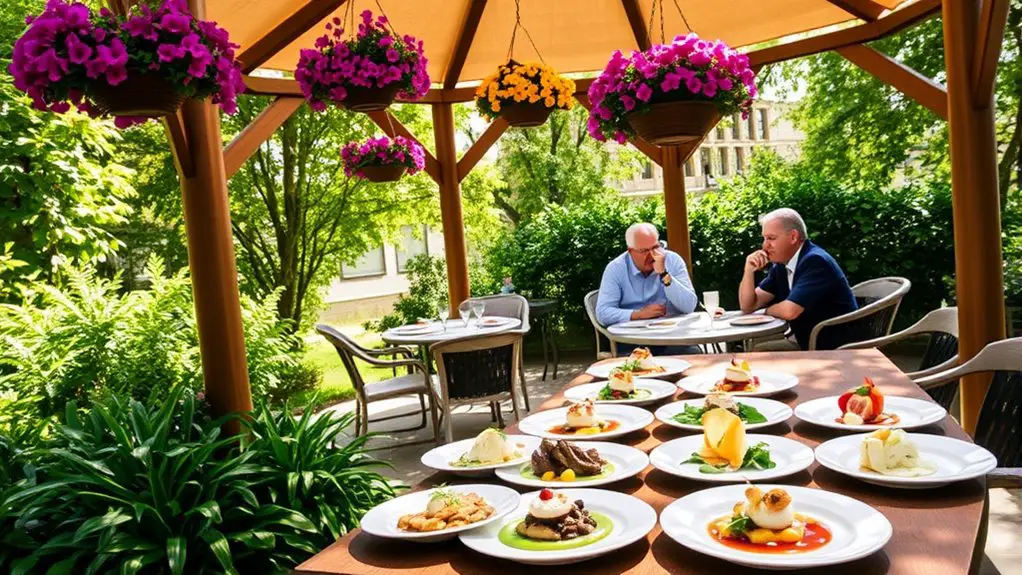When choosing judges for your gazebo cooking competition, prioritize culinary experience and a genuine passion for food. Look for judges with diverse palates who can appreciate creativity and offer constructive feedback. Guarantee fairness by establishing clear criteria and managing conflict of interest. Don’t overlook the importance of judges who can create a fun atmosphere, as this boosts morale and engagement. By following these tips, you’ll set the stage for a memorable cooking experience that captivates everyone involved.
Consider Culinary Experience and Knowledge
When you’re selecting judges for cooking competitions, considering their culinary experience and knowledge is vital. Look for individuals with impressive culinary credentials, such as professional chef training or extensive restaurant experience. Their background equips them with a deep understanding of flavor profiles, which is key when evaluating dishes. Familiarity with tasting techniques also plays a significant role; a good judge should know how to identify balance, texture, and presentation effectively. You want judges who can appreciate the artistry of each dish while providing constructive feedback. Their expertise not only enhances the competition’s credibility but also inspires contestants to elevate their culinary skills. Ultimately, knowledgeable judges guarantee a fair and engaging experience for everyone involved.
Look for Enthusiasm and Passion for Food
Enthusiasm and passion for food can transform a cooking competition from a mere event into a celebration of culinary creativity. When choosing judges, look for individuals who exude culinary enthusiasm and have an authentic appreciation for food. These judges not only assess dishes critically but also bring a contagious energy that elevates the entire atmosphere. They’re likely to appreciate the artistry involved in cooking, recognizing the effort and creativity behind each dish. Their enthusiasm encourages contestants, fostering a supportive environment where everyone feels free to express themselves. Ultimately, selecting judges who embody food appreciation will enhance the experience for both participants and spectators, making your competition a delightful showcase of culinary talent and passion.
Seek Out Diverse Palates
How can a cooking competition truly reflect the richness of culinary art? By seeking out judges with diverse palates, you guarantee a vibrant tapestry of cultural influences and flavor profiles. When judges represent different backgrounds and experiences, they bring unique perspectives to the table, enhancing the evaluation process. Imagine the depth of insight when a judge familiar with Asian cuisines critiques a dish inspired by Mediterranean flavors. This cross-pollination of tastes not only enriches the competition but also celebrates the freedom of culinary expression. So, don’t limit yourself to a homogenous panel; embrace variety. Each judge’s distinct taste can elevate the experience for both competitors and spectators, making your gazebo competition a true celebration of the culinary arts.
Prioritize Constructive Feedback Skills
When selecting judges for cooking competitions, it’s essential to prioritize their ability to provide constructive feedback. You’ll want judges who communicate clearly, draw from their culinary experience, and balance praise with critique. This approach not only helps contestants grow but also enhances the overall quality of the competition.
Communication Style Matters
What makes a judge’s feedback truly impactful in a cooking competition? It’s all about their communication style. A judge who provides effective feedback uses clear, specific language that encourages improvement. They engage in dialogue, making contestants feel valued and respected. Instead of simply critiquing, they foster a constructive atmosphere where chefs can learn from their mistakes.
For instance, if a dish lacks seasoning, a good judge will explain why and suggest ways to enhance flavors, rather than just saying it’s bland. This approach not only builds confidence but creates a positive environment that celebrates creativity. When you choose judges who excel in these skills, you’re ensuring that competitors leave inspired and equipped to refine their culinary artistry.
Experience in Culinary Arts
The foundation of impactful judging in cooking competitions lies in the judges’ experience in culinary arts, particularly their ability to offer constructive feedback. You want judges who not only have strong culinary education but also significant professional experience in diverse kitchens. This combination equips them to evaluate dishes with a discerning palate and a keen eye for detail. Their insights should guide contestants toward improvement, fostering a supportive environment that encourages creativity. Look for judges who understand the nuances of flavors, techniques, and presentation, ensuring they can articulate their critiques clearly. By prioritizing judges skilled in providing constructive feedback, you create a vibrant atmosphere where chefs can flourish, learn, and ultimately embrace their culinary freedom to explore and innovate.
Balanced Critique Approach
While judges must possess a keen eye for detail, it’s equally important that they adopt a balanced critique approach that emphasizes constructive feedback. This guarantees contestants feel encouraged while still receiving valuable insights. Here are three key ways to prioritize balanced feedback:
- Start with Positives: Highlight what the contestant did well before discussing areas for improvement. This builds confidence.
- Be Specific: Offer clear examples of constructive criticism. Vague feedback can be frustrating and unhelpful.
- Encourage Growth: Frame suggestions as opportunities for learning. This fosters a positive atmosphere and inspires contestants to evolve.
Ensure Fairness and Impartiality
When selecting judges for cooking competitions, you must prioritize fairness and impartiality to maintain credibility. This means bringing together judges with diverse backgrounds and expertise, establishing clear judging criteria, and implementing a robust conflict of interest policy. By ensuring these elements are in place, you create a level playing field that fosters trust among participants and spectators alike.
Diverse Backgrounds and Expertise
Having judges with diverse backgrounds and expertise is essential for ensuring fairness and impartiality in cooking competitions. This variety not only enriches the judging process but also respects the cultural influences and culinary traditions that participants bring. Here are three key reasons to contemplate:
- Broadened Perspectives: Judges from different backgrounds can appreciate the nuances of various cuisines, making for a more informed evaluation.
- Balanced Judging: A mix of expertise helps prevent bias, ensuring each dish is judged fairly, reflecting its true value.
- Encouragement of Creativity: Diverse judges inspire contestants to innovate, knowing their unique culinary traditions will be recognized and celebrated.
Embracing diversity truly elevates the competition, allowing everyone to shine in their own culinary journey.
Clear Judging Criteria
Establishing clear judging criteria is essential to guarantee fairness and impartiality in cooking competitions, as it provides a transparent framework for both contestants and judges. Clear standards should include specific categories such as taste, presentation, and creativity, ensuring everyone knows what to expect. This clarity enhances judging transparency, fostering trust among participants.
As you develop your criteria, consider involving judges in the process to align their expertise with the standards set. This collaboration not only improves the criteria but also empowers judges and contestants alike. Ultimately, when everyone understands the rules, the competition thrives in a spirit of freedom and fairness, making the experience enjoyable and rewarding for all involved.
Conflict of Interest Policy
To guarantee fairness and impartiality in cooking competitions, implementing a robust conflict of interest policy is essential. This policy not only upholds ethical standards but also fosters trust among participants. Here are three key components to reflect upon:
- Disclosure Requirements: Judges should disclose any personal or professional relationships with participants to prevent bias during evaluations.
- Recusal Processes: Establish clear procedures for judges to recuse themselves from judging when a conflict arises, ensuring transparent conflict resolution.
- Regular Training: Provide ongoing education about ethical standards and conflict management, keeping judges informed and accountable.
Involve Judges With a Sense of Fun
When you invite judges with a sense of fun into your cooking competition, the entire atmosphere transforms into a vibrant celebration of culinary creativity. These judges bring enthusiasm, encouraging participants to explore fun themes and engage in playful challenges. A lighthearted approach fosters a supportive environment, allowing chefs to showcase their unique styles without the pressure of rigid expectations. Imagine judges who not only taste but also participate in quirky tasks, like creating spontaneous dishes or sharing laughs over culinary mishaps. Their playful spirit can inspire contestants to step outside their comfort zones, ultimately leading to delicious surprises. By prioritizing fun-loving judges, you’re ensuring an unforgettable experience for everyone involved, where creativity and joy take center stage.
Frequently Asked Questions
How Many Judges Should I Have for My Cooking Competition?
You might think fewer judges simplify things, but having three to five guarantees scoring balance and diverse opinions. Proper judge selection creates a fair competition, letting everyone enjoy a flavorful culinary showdown without bias.
Should Judges Have Previous Competition Experience?
Yes, judges should have previous experience to guarantee they meet judging standards. Their expertise not only enhances the competition’s quality but also brings credibility, fostering a vibrant atmosphere where creativity and culinary freedom thrive.
Can I Include Non-Professional Cooks as Judges?
Imagine the excitement of tasting unique dishes. Including non-professional cooks as judges can bring diverse perspectives, enriching the competition’s atmosphere. Amateur judges often connect with participants, fostering a relaxed, enjoyable experience everyone can cherish.
How Do I Handle Disagreements Among Judges?
When disagreements arise among judges, employ effective dispute resolution strategies. Utilize mediation techniques to facilitate open dialogue, ensuring each perspective is heard. Foster a collaborative environment where solutions emerge, empowering everyone involved to feel valued and respected.
What Criteria Should Judges Use for Scoring?
When scoring, you should consider taste balance, presentation scores, and texture. Each judge’s passion for food and attention to detail will enhance the competition, creating an environment where creativity and culinary freedom truly shine.

